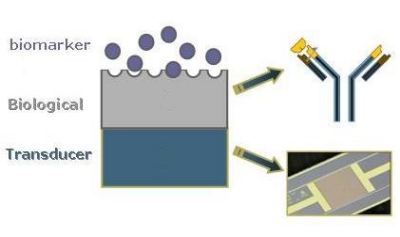By Kris Verstreken, MD, PhD and Hanne Degans, PhD – Imec
March 9, 2011 — How will nanoelectronics and nanotechnology contribute to prevention, diagnosis, therapy and post therapy of diseases? Will the introduction of nanoelectronics in pharmacy bring a breakthrough in developing revolutionary therapies such as immuno- or gene therapy? The continued scaling of chip technology resulted in nanoelectronics dimensions evolving increasingly toward cell dimensions, cell parts, and even molecules. As a result, electronic and biological functions can interact, and new applications arise in the area of biomedical electronics.
Biosensor technologies combining a biological identifying element (protein, DNA/RNA, virus, cell) with a physicochemical detector component are widely applicable in drug development at all stages of the development track (from lab to clinical tests), for localized therapy, for inexpensive and comfortable tools for post-therapy, for early diagnosis (genetic profiling) and even for prevention. Innovative biosensors based on nanoelectronics and nanotechnology will be key to creating a better, patient-oriented and less expensive healthcare in the future.
The pharmaceutical industry’s interest in disease diagnosis is growing. These days, diagnosis is being carried out especially by post-symptomatic analysis and diagnosis in laboratories. In the future, technologies based on nano-electronics will enable diagnosis by means of genetic or other early screening of patients, and therapies will be administered with personalized observation. Biomedical electronics will also improve treatment efficiencies and reduce its costs. Sensor-based technologies will enable localized therapy, only intervening when necessary and reducing the side effects of a treatment. Post-therapy based on nanoelectronics will be less burdensome on the daily life of the patient. Such instruments should be low-cost, portable, and comfortable in maintenance and operation.
An essential aspect for the pharmaceutical industry is that new measuring methods are not only fast and efficient; they should also be widely applicable and therefore can be produced in large volumes at reasonable cost. The industry is looking for instruments that can be used not only for drug development, but also during the post-therapeutic stage, to keep an eye on the patients that participated in the clinical tests for drug development. These instruments that will be used for genetic profiling for disease diagnosis and prevention.
 |
|
Figure. General concept of a biosensor to detect a target in blood. |
New measuring methods using nanoelectronics-based biosensors are of key interest to the pharmaceutical industry because of the variety of applications. They are useful for diagnosis, but also in lab studies (genetic profiling), for preclinical and clinical tests, and for therapy and post therapy. Molecular biosensors detect a biomarker (antibodies, enzymes, DNA, diseased cells, foreign substances such as radioisotopes) in blood. They allow fast, exact and very specific measurement of a biomarker or of several different biomarkers at the same time. Biomarkers are blood substances that are characteristic for a certain biological condition and therefore can be used to determine diseases. A biomarker can be a genetic code within the DNA that is characteristic for a particular disease; but it can also be a diseased cell, such as a cancer cell. Additionally, biomarkers can be foreign substances such as radio isotopes, which are being injected into the blood to examine, for example, organ functions. In order to detect biomarkers in the blood, a blood sample needs to be analyzed. Currently, time-consuming and expensive lab tests have to be carried out in several steps to detect biomarkers. When molecular biosensors are integrated into an electronic system (lab-on-chip), detection can be done much faster and cheaper. Imec develops lab-on-chip systems, such as a breast cancer diagnostic system that can detect cancer cells.
Chip technology’s role in healthcare has the world’s attention. Nanoelectronics will help more patients than we can today, at a lower cost price and for a larger number of diseases, or at least such is the hope. Imec’s research supports the necessary innovation of biomedical instruments for prevention, diagnosis and therapy. Within its life science program, imec cooperates with industrial partners for smart electronic systems in order to study diseases, diagnosis and disease therapy: lab-on-chip systems, nanoparticles for treatment of diseases, technologies for intelligent implants, etc.
Kris Verstreken obtained the degree of Medical Doctor, the Ph.D. degree in Medical Sciences, and the M.S. degree in Electrical Engineering from the Catholic University of Leuven (Belgium). Since 2008, Kris is director of imec’s Life Sciences program.
Hanne Degans received the Ph.D degree in Sciences at the Catholic University of Leuven (Belgium). Since 2008, she works as a scientific editor and external communications officer at imec.
Follow Small Times on Twitter.com by clicking www.twitter.com/smalltimes. Or join our Facebook group

